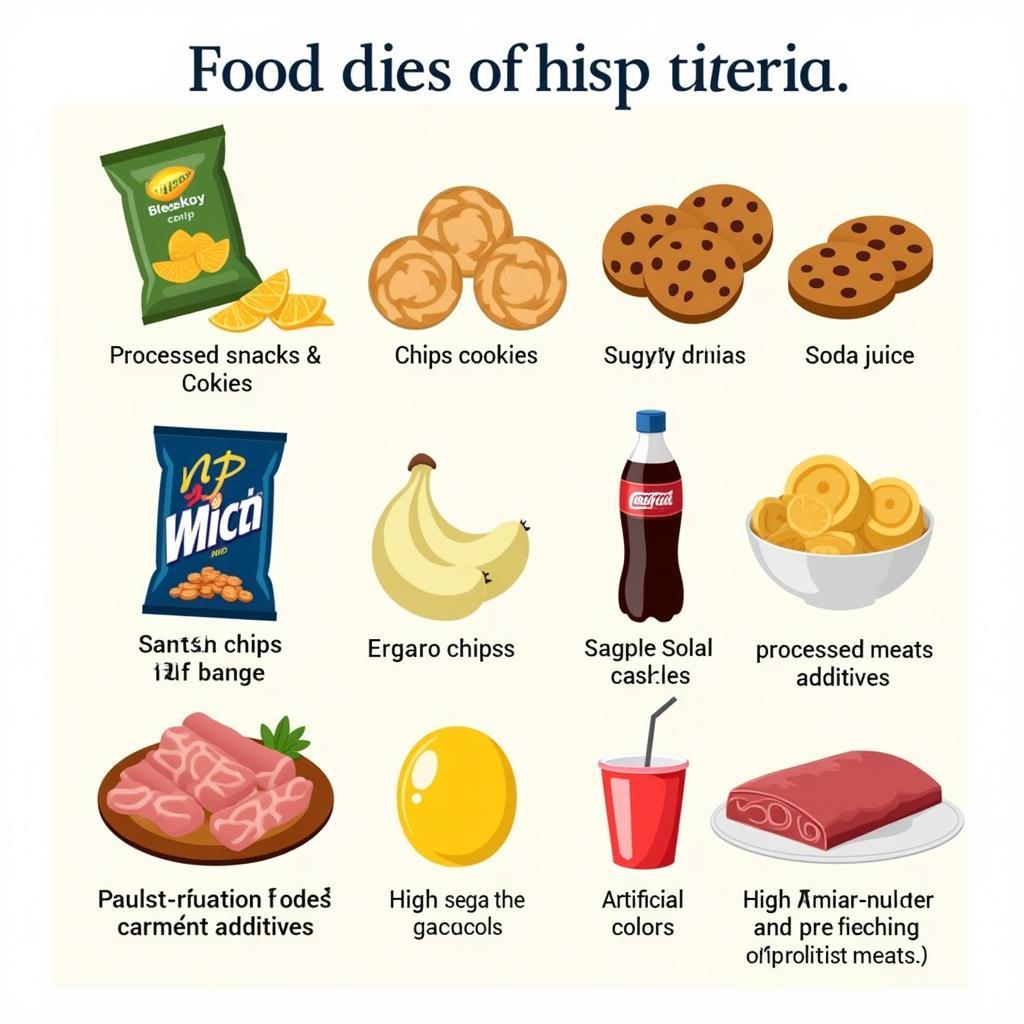Pyroluria, also known as kryptopyrroleuria, is a metabolic condition that can impact your overall health. If you’re exploring pyroluria and dietary adjustments, understanding which Pyroluria Foods To Avoid is crucial. Managing this condition often involves dietary changes to support your body’s needs and minimize potential symptom flare-ups.
Understanding Pyroluria and Its Impact on Diet
Pyroluria leads to an excessive excretion of kryptopyrrole (HPL) in urine, which binds to essential nutrients like zinc and B6, making them unavailable for the body. This deficiency can manifest in various symptoms, including anxiety, mood swings, and skin issues. Dietary management plays a key role in mitigating these effects by focusing on nutrient-rich pyroluria foods to avoid and those that replenish lost nutrients.
The Importance of Nutrient Replenishment in Pyroluria
Addressing nutrient deficiencies is paramount in managing pyroluria. While avoiding certain foods is crucial, emphasizing nutrient-dense options is equally important. Foods rich in zinc and B6, along with other essential vitamins and minerals, support various bodily functions and help counteract the effects of HPL excretion.
Pyroluria Foods to Avoid: A Detailed Guide
Several food groups can exacerbate pyroluria symptoms. Knowing what to avoid is the first step in building a supportive dietary plan.
Foods High in Sugar and Processed Carbohydrates
High-sugar foods and refined carbohydrates can deplete B vitamins, further aggravating the nutrient deficiencies associated with pyroluria. Avoiding sugary drinks, processed snacks, and white bread is crucial.
- Sugary drinks (soda, juice)
- Processed snacks (chips, cookies)
- White bread and pastries
Foods Containing Food Additives and Artificial Colors
Artificial food additives and colors are often chemically processed and can place extra stress on the liver, potentially hindering its ability to process HPL. Avoiding these additives is a key element of pyroluria management.
- Processed meats containing nitrates
- Foods with artificial colors and flavors
- Certain packaged and canned goods
 Foods to Avoid with Pyroluria: Processed Foods and Sugary Drinks
Foods to Avoid with Pyroluria: Processed Foods and Sugary Drinks
Certain Grains and Legumes
While generally considered healthy, some grains and legumes can interfere with nutrient absorption in individuals with pyroluria. Monitoring your tolerance to these foods is important.
- Corn
- Soybeans
- Certain beans
Foods High in Histamine
Histamine intolerance is often associated with pyroluria. Foods high in histamine can trigger allergic-like reactions and exacerbate existing symptoms.
- Aged cheese
- Fermented foods
- Smoked meats
“Understanding the connection between histamine intolerance and pyroluria is essential for effective dietary management,” says Dr. Amelia Hernandez, a registered dietitian specializing in metabolic disorders. “Paying attention to your body’s response to histamine-rich foods can help pinpoint triggers and create a personalized dietary approach.”
Building a Pyroluria-Friendly Diet: Foods to Embrace
While knowing pyroluria foods to avoid is essential, focusing on incorporating nutrient-rich options is equally crucial. A balanced diet rich in whole foods can significantly improve overall health and manage pyroluria symptoms.
Nutrient-Rich Options to Include in Your Diet
- Leafy green vegetables (spinach, kale)
- Fruits (berries, apples)
- Lean protein sources (chicken, fish)
- Nuts and seeds (almonds, pumpkin seeds)
- Whole grains (brown rice, quinoa)
Conclusion: Optimizing Your Diet for Pyroluria Management
Navigating your diet with pyroluria involves understanding both pyroluria foods to avoid and nutrient-rich options to embrace. By focusing on a balanced approach, you can effectively manage symptoms and support your overall well-being. Remember to consult with a healthcare professional or registered dietitian for personalized guidance.
FAQ
- What is pyroluria?
- What are the common symptoms of pyroluria?
- How is pyroluria diagnosed?
- Are there any supplements recommended for pyroluria?
- Can diet alone manage pyroluria?
- What are some good snack options for someone with pyroluria?
- Can children have pyroluria?
“Making informed dietary choices can significantly impact your pyroluria journey,” adds Dr. Hernandez. “Working with a healthcare professional can provide tailored guidance and ensure you’re meeting your individual nutritional needs.”
Common Pyroluria Scenarios and Questions:
- Scenario: Feeling anxious and experiencing digestive issues after consuming certain foods. Possible Solution: Keep a food diary to identify potential trigger foods.
- Question: Can stress exacerbate pyroluria symptoms? Answer: Yes, managing stress through relaxation techniques can be beneficial.
Further Resources:
- Explore our other articles on managing metabolic conditions.
- Learn more about the importance of gut health in overall wellness.
Need support? Contact us at Phone Number: 02437655121, Email: [email protected], or visit us at 3PGH+8R9, ĐT70A, thôn Trung, Bắc Từ Liêm, Hà Nội, Việt Nam. Our customer service team is available 24/7.